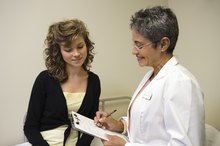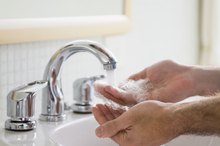What does fact checked mean?
At Healthfully, we strive to deliver objective content that is accurate and up-to-date. Our team periodically reviews articles in order to ensure content quality. The sources cited below consist of evidence from peer-reviewed journals, prominent medical organizations, academic associations, and government data.
The information contained on this site is for informational purposes only, and should not be used as a substitute for the advice of a professional health care provider. Please check with the appropriate physician regarding health questions and concerns. Although we strive to deliver accurate and up-to-date information, no guarantee to that effect is made.
How to Stop Acne Scarring
Moderate to severe acne can lead to scars on your face 23. If you suffer from acne outbreaks, take steps to prevent your breakouts from scarring your skin. If the damage is done and you already have acne scars, you have several options for reducing their appearance 2. Treat mild scarring at home using over-the-counter products. If your scarring is severe, consider seeing a dermatologist for professional treatments that can get rid of your acne scars 2.
Prevent Acne Scars
Wash your face twice a day. Prevent acne breakouts that lead to scarring by keeping your face clean. Use warm water and a mild soap to wash your face in the morning, at night and after working out.
How to Get Rid of Dark Spots From Shaving
Learn More
Do not squeeze or pick at pimples. If you have acne breakouts, try not to touch the skin. Squeezing and picking your pimples can lead to scarring.
Avoid the sun. Wear sunblock if you must go out in the sun. The sun's ultraviolet rays cause damage to your skin and increase the appearance of acne and acne scars 2.
How to Treat Acne With Hydrocortisone
Learn More
Purchase topical acne medications at the drugstore. Try using topical acne treatments that include benzoyl peroxide or salicylic acid to get rid of the acne you have on your face before it can cause scarring.
See a dermatologist to treat severe acne. Ask your doctor whether oral antibiotics, prescription-strength topical creams or cortisone injections could help get rid of your acne and prevent scarring.
- Wash your face twice a day.
- If you have acne breakouts, try not to touch the skin.
Treat Acne Scars
Use topical over-the-counter lotions that contain vitamin C, glycolic acid or retinol to reduce the appearance of mild acne scarring. These creams increase collagen and can help improve skin that has deep acne scars 2.
Consider microdermabrasion. Purchase a home microdermabrasion kit or see a dermatologist for a professional treatment. Microdermabrasion treatments smooth your skin and reduce the appearance of scarring.
Ask your dermatologist for a chemical peel. Some acne scarring is best treated using a chemical peel process, which removes the top layer of skin from your face.
Talk to your dermatologist about laser skin treatments to remove severe acne scars 2. Dermatologists can use laser resurfacing or fractional laser therapy to smooth your skin's surface and reduce the appearance of deep acne scars 2.
Warnings
Talk to a dermatologist before starting any home acne or acne scarring treatments. Some acne scars can be made worse by improper use of home treatments.
- Use topical over-the-counter lotions that contain vitamin C, glycolic acid or retinol to reduce the appearance of mild acne scarring.
- Microdermabrasion treatments smooth your skin and reduce the appearance of scarring.
Related Articles
References
- Women's Health: Acne
- AcneNet: Acne Scars
- Teens Health: Can Acne Scars Be Removed?
- "Questions and Answers About Acne." National Institute of Arthritis and Musculoskeletal and Skin Diseases (NIAMS). Jan 2006. National Institutes of Health.
- Zaenglein AL, Pathy AL, Schlosser BJ, Alikhan A, Baldwin HE, et. al. "Guidelines of Care for the Management of Acne Vulgaris." Journal of the American Academy of Dermatology. 2016;74(5):945-73.
Writer Bio
Leigh Good has been writing for magazines and newspapers for more than 10 years. Her work has been published in numerous print and online publications. Good has a bachelor's degree in print journalism from Georgia State University.








